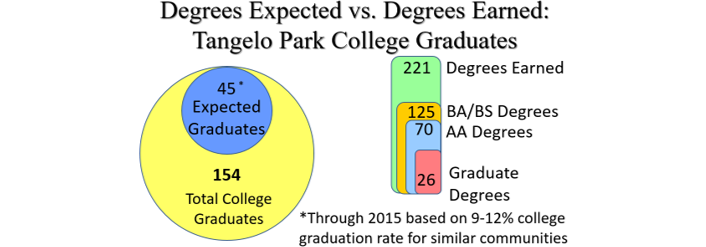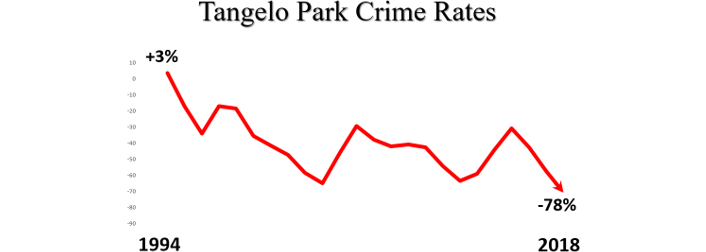A philanthropic initiative is creating educational opportunities for low-income students.

National data indicates that students living in the lower economic quartile in the United States have a 10 percent chance of graduating from college. The odds against these students graduating from college are roughly nine to one. Students in the upper economic quartile, however, have an 88 percent chance of obtaining a college degree. Clearly, wealth is a good predictor of student success at a college or university.1 Scholars argue that people who have the potential to succeed in a college or university environment exist everywhere, from underserved neighborhoods to upper-income communities.2
Economic data suggests that a college degree is worth an estimated average of one million dollars in additional lifetime earnings versus only a high school diploma.3 There is no disputing that education can help eliminate economic inequality for a large segment of our population. In Florida, hotelier and philanthropist Harris Rosen understands the connection between education and economic mobility.
In the early 1990s, Rosen leveled the playing field for the Tangelo Park community in Orange County, Florida, by working with community leaders to develop the Tangelo Park Program (TPP). Today the TPP demonstrates a variety of effective strategies that other communities can adopt to provide educational equity and opportunity to residents.
Rosen said of the Tangelo Park community, "After all of these years working with the Tangelo Park community, we are absolutely convinced that there is as much intellectual talent in our underserved neighborhoods as there is in any of our more affluent gated communities."4
The Tangelo Park Program: A Success Story
In 1993, Tangelo Park typified a low-socioeconomic-status urban community in America: high crime rate, overt drug problems, poor school attendance, declining test scores, and elevated high school dropout rates. Tangelo Park was a community with very little hope for itself and its children. The community knew that it needed to nurture its children and focus on their academic success to reverse these negative trends. College and university enrollment and the attainment of a degree became viable when Rosen recognized the Tangelo Park community's capacity for self-improvement. Rosen worked in tandem with community leaders to identify the multiple obstacles that prevent success in college and formulate a plan to overcome those obstacles. Together, they established the TPP. The program provides an early childhood education and a full college scholarship—at no cost to the community—to students in the Tangelo Park community.

Students from the neighborhood do not need to demonstrate financial need or meet certain academic requirements to qualify for the college scholarship; the only condition is that students must maintain residency in Tangelo Park two years prior to high school graduation and throughout their college degree attainment. TPP funds provide access to community colleges and vocational or technical schools that are often better acquainted with the real life of low-income students. The scholarship covers room and board, textbooks, and other supplies, thus removing subsequent costs that are obstacles even to scholarship winners. Tangelo Park students graduate debt-free. The program can be adapted to various contexts.
Today, nearly 100 percent of children living in Tangelo Park graduate from high school and 78 percent of those who remain in the community and attend a four-year institution will graduate with a degree, either directly or through a community college. Beginning at two years of age, students in the community show important progress in knowledge acquisition, executive function, and social-emotional learning. When these students enter kindergarten, they have the skills they need to succeed.
Community college success rates in the Tangelo Park community are higher than the national average. Eighty-three percent of Tangelo students who attend vocational school receive certification, and 83 percent of college graduates who attend graduate school receive advanced degrees.
The TPP is innovative in various ways. Funding is guaranteed by the Rosen Foundation for as long as needed. All decisions are made during monthly community board meetings. The TPP is a working partnership between the Rosen Foundation, the Tangelo Park Community, the University of Central Florida (UCF), and the Orange County Public Schools. UCF has evaluated the program and has compiled data to validate its impact. Figure 2, for example, shows a higher-than-expected number of college graduates (154 versus an expectation of 45 through 2015) in Tangelo Park—a graduation rate that is similar to those in the upper economic quartile.


Today, the Rosen Foundation serves as a safety net, distributing fewer scholarships because Tangelo Park students now earn financial support from other sources—a direct result of their improved academic achievement.
The TPP has energized the community. Since the establishment of the TPP in 1993, crime in the Tangelo Park neighborhood has declined by more than 78 percent.5 Student mobility rates have dropped significantly, and housing values have increased. Community pride has become a hallmark of the Tangelo Park neighborhood. A return on investment (ROI) study showed that for every dollar invested in the program, seven dollars have been returned to society.6

A New Kind of Philanthropy
Rosen has taken a unique approach to philanthropy. He is not the kind of well-intentioned philanthropist who makes decisions for a community that he does not come from or rarely interacts with. Rather, he worked with Tangelo Park community leaders to develop a program that would benefit the entire community, and he remains engaged with the community. By directly encouraging community changes, an initial act of charity has resulted in opportunity and equality.
Rosen believes that if dozens of wealthy individuals would sponsor communities in need, such acts of giving would have a significant impact on reducing poverty in our cities and would change the lives of thousands, perhaps even millions, of children throughout America. Replicating the TPP in one thousand neighborhoods would have a significant impact on the economy. The program is simple and inexpensive to implement. Since its inception 26 years ago, approximately $13.5 million has been spent on TPP.
Why Adopt a Neighborhood?
Embracing a community financially has the following results:
- Generates new public funding and has a direct economic impact
- Expands place-based efforts in dozens of diverse communities
- Demonstrates how public funding can be used to drive student, family, and community well-being
- Empowers a learning community to inform and improve like-minded efforts
- Elicits and sustains family and community participation that requires schools and universities to be more accountable and responsive to their local communities
- Builds coalitions that effectively bring together parents and community-based organizations to address the variety of needs and interests of their community and make positive changes
Parramore Neighborhood Program
The success of TPP encouraged Rosen to replicate the initiative in the Parramore neighborhood in downtown Orlando. Rosen estimates that the Parramore Program will cost significantly more than TPP (approximately $3–$4 million more per year) because the Parramore community is much larger than Tangelo Park.
The TPP is a positive model for other communities and demonstrates that assistance to high-risk families can yield a very attractive long-term return on investment for society through educational gains, lower crime rates, and community empowerment. Orange County Public Schools Superintendent Barbara Jenkins said she "looks forward to a time when the same will be true in the Parramore neighborhood."
Spread the Word!
This brief blog post attempts to capture the spirit of the Rosen Foundation's Tangelo Park and Parramore Programs. Much more comprehensive data is available including complete impact data, an ROI study, crime data, case studies, and media reports. If you are interested in receiving any or all of these materials or have questions, please contact [email protected] or [email protected]. Tangelo Park Programs are needed across the country.
For more insights about advancing teaching and learning through IT innovation, please visit the EDUCAUSE Review Transforming Higher Ed blog as well as the EDUCAUSE Learning Initiative and Student Success web pages.
Notes
- Erik Sherman, 2015. "Wealthy Kids 8 Times More Likely to Graduate College than Poor," Forbes, February 5, 2015. ↩
- Steven Jay Gould, The Mismeasure of Man (New York: Norton, 1981). ↩
- Anthony P. Carnevale, Stephen J. Rose, and Ban Cheah, The College Pay Off, research report (Washington DC: Georgetown University Center on Education and the Workforce, 2011). ↩
- "Tangelo Park Program (Orlando, Florida): A Broader, Bolder Approach to Education," BBA (website), updated 2017. ↩
- Sibley Fleming, "Real Estate Gives Back: Harris Rosen Saves Minds," Commercial Property Executive (website), January 25, 2019. ↩
- Lance Lochner, "Measuring the Impacts of the Tangelo Park Project on Local Residents," December 2010. ↩
Chuck Dziuban is Director of the Research Initiative for Teaching Effectiveness at the University of Central Florida.
Marcella Bush is Editor/Research Associate of Research Initiative of Teaching Effectiveness at the University of Central Florida.
© 2020 Chuck Dziuban and Marcella Bush. The text of this work is licensed under a Creative Commons BY 4.0 International License.
